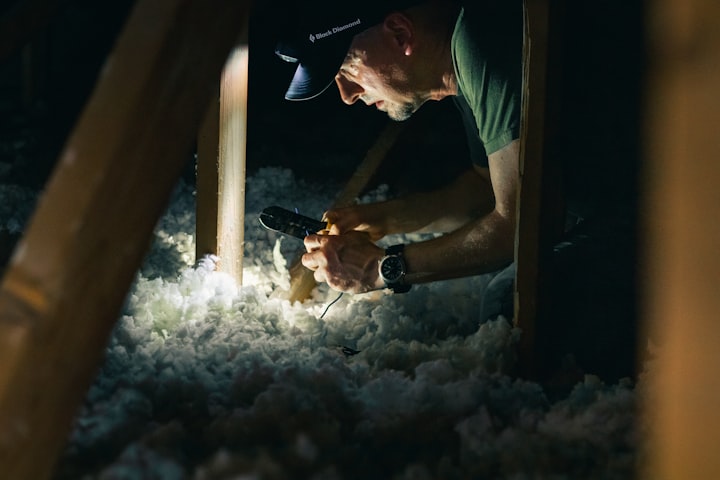Rewire Your Mind: How to Train Yourself to be Happy
Making "The Work" work for you.

The almighty curse of overthinking. We’ve all been there. Stop me if this sounds familiar: you and your significant other or your best friend are arguing. All of a sudden, they say something that sends a message to your brain that reads something like “they hate me” or “they think I'm ugly” or “if they loved me they would do xyz.”
If you’ve been in this situation you know that most of the time, these thoughts simply end up not being true. But your brain, the powerful brain that you have been taught to trust, proves to deceive you right before your eyes.
You might be thinking, “yeah, that all sounds well and good, but what’s your point?”
I’d like to introduce you to the new rockstar of your limbic system - The Work.
Now, the work is a simple, yet specific process that is created to rewire your thoughts to, more or less, prove yourself wrong about the thoughts you’re experiencing.
To begin, I give you the four questions.
Is it true?
Can you absolutely know that it’s true?
How do you react, what happens when you believe that thought?
Who would you be without that thought?
Let’s begin our first example.
The thought: Charlie hates me.
Is it true?
The snap reaction to this question is usually yes. If this answer comes out to be a no, I want you to sit with this realization for a minute, then proceed to question three.
2. Can you absolutely know that it’s true?
Let’s say the answer is yes. Now, we provide three pieces of evidence.
She never compliments me.
She made a mean sarcastic comment last night.
She doesn't give me enough affection.
3. How do you react, what happens, when you believe that thought?
What are the physical sensations you’re feeling? What are you telling yourself?
Ie. My whole body feels tense. My mood plummets so far down that it can’t be resurrected. I lash out on Charlie.
4. Who would you be without that thought?
I would be happier and free of tension both in my body and in my relationship.
5. Now, - we’re going to turn this around to the self.
In other words, how can I take these pieces of evidence and make them about me?
For instance:
I never compliment me.
This tells us that part of the reason we feel like we need Charlie to compliment us is because we don’t compliment ourself.
B) I don’t always get her sarcasm.
This tells us that it’s not entirely Charlie’s fault that we don’t get her sarcastic comments, but to note that this is something we can kindly request she ease up on, while also remembering that we take things a little too seriously sometimes.
C) I don’t give myself enough affection.
This tells us that the reason we crave affection from Charlie is not because Charlie isn’t affectionate enough, but because we can’t love ourselves enough to provide ourselves the affection we need.
When we turn these thoughts around to the self, we get a result that is attainable. What is attainable is conquerable.
Now that we have an idea of how to deal with negative thoughts with other people, let’s take a look at how we can combat negative thoughts about ourselves.
The thought: I am ugly.
Is it true?
Yes.
2. Can you absolutely know that it’s true?
Yes, I have a mirror.
The evidence:
My nose is too big.
I’m fat.
I don't look like Kim Kardashian.
3. How do you react, what happens, when you believe that thought?
My whole body feels sick. I blame other people for not making me feel beautiful. I feel uncomfortable being looked at. I’m depressed.
4. Who would you be without that thought?
I would be happy and confident. (Meanwhile, the brain goes “Ha! As if.”)
5. Turn the evidence around, but this time, we’re going to make these into positive affirmations.
My nose does not dictate my beauty or self worth.
My body is beautiful the way it is.
Kim Kardashian doesn't even look like Kim Kardashian.
Now, if you’re like many of us nay-sayers, these affirmations might not be enough for you. For you, I offer a more active turnaround.
My nose is exactly the right size for my face, and anyone who says it’s not is just insecure about themselves.
B) My body may not be perfect in my eyes, but I can make small daily strides to slowly get it to where I feel it needs to be.
C) The media tricks us all into believing that we need plastic surgery to be societally accepted as beautiful, but I can make my own definition of beautiful that works for me and my body.
Are we getting the hang of this?
Look, I know that this may all sound like a load of baloney right off the bat, but as a person who has used this method for nearly a decade now, I’m going to tell you that with practice, as cliche as it may seem, The Work does just that - it works.
Now - go rewire your mind!
*All credit goes to Byron Katie, creator of https://thework.com
About the Creator
Ella Riley
A struggling artist on the east coast who writes about a little bit of everything. Find my work in multiple vocal communities!






Comments
There are no comments for this story
Be the first to respond and start the conversation.